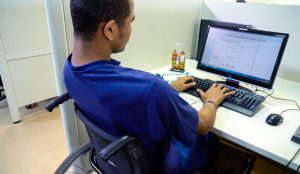[:en]People with disabilities still face many barriers that impede their integration into society
[:es]Las personas con discapacidad todavía se enfrentan a muchas barreras que dificultan su inclusión en la sociedad[:]
[:en] Having some type of disability in Brazil means to face a daily battle. Starting from the difficulties to move around the city either on the streets, use public transportation, go shopping, or even work in places that are not accessible. According to the 2010 IBGE census, in Brazil, 45.6 million people have some type of disability, It represents 24% of the population. In addition to the lack of access to products, services and information, there is still prejudice and resistance in the labor market.
Having some type of disability in Brazil means to face a daily battle. Starting from the difficulties to move around the city either on the streets, use public transportation, go shopping, or even work in places that are not accessible. According to the 2010 IBGE census, in Brazil, 45.6 million people have some type of disability, It represents 24% of the population. In addition to the lack of access to products, services and information, there is still prejudice and resistance in the labor market.
In the face of so many challenges, the Organization of the United Nations (UN) created the International Day of People with Disability which is celebrated on December 3rd. The goal is to draw attention to the importance of discussing proposals and public policies to integrate these people into society.
 The administrative assistant of the Eternal Father’s Children Association (Afipe), Jefferson Pereira Santos, was run over when he still lived in his homwtown in Altamira (PA). He lost the movements of his legs. Thereafter, a struggle began. The obstacles seemed impossible to overcome. “When I realized I was paraplegic I did not want to go out of the house. But, as time went through, I saw that it was possible to win at life. Then, my parents and I moved to Goiânia,” he recalls.
The administrative assistant of the Eternal Father’s Children Association (Afipe), Jefferson Pereira Santos, was run over when he still lived in his homwtown in Altamira (PA). He lost the movements of his legs. Thereafter, a struggle began. The obstacles seemed impossible to overcome. “When I realized I was paraplegic I did not want to go out of the house. But, as time went through, I saw that it was possible to win at life. Then, my parents and I moved to Goiânia,” he recalls.
The expectations were many at the time they reached the capital of Goiás but soon they turned into frustration. “Before coming to Afipe, I passed all the phases of a selection recruitment process. However, I was not able to work because the three-story building was not accessible. One more time, the struggle to get another opportunity began. Then, I got an opportunity here in the Association,” he says.
Afipe has about 300 employees and the building offers accessibility as it is determined by the federal Law nº 10.098, of December 19th, 2000. The law establishes general rules and basic criteria for promoting accessibility. Jefferson turned 21 in December. For him, now, there are many achievements to celebrate. “I relearned to go to the bathroom, feed myself and deal with this limited life. I found the paradise here at Afipe once there is not only the accessibility in the building but also in the treatment of other employees. They all want to help,” he says.
Rights
 Since July 2016, the Brazilian Law on the Integration of Disabled People entered into force, with the goal of ensuring the rights of disabled people and punish discriminatory attitudes. Even so the law represents a small step when compared to the immense prejudice that still exists. Despite advances, there are still many barriers to overcome. It is what says the Coordinator of the Forum of Integration of the People with Disability and rehabilitated by the INSS [Brazilian Social Security Administration] into the Labor Market, Patrícia Souza Oliveira. “In Brazil, we have to stimulate the executive, legislative and judicial public agendas so that they take actions that aim to bring information to the whole society on issues regarding the different types of disability”. For the coordinator, there is a behavioral barrier caused by the ignorance of the vast majority of people, what put the person with a disability in a condition of vulnerability.
Since July 2016, the Brazilian Law on the Integration of Disabled People entered into force, with the goal of ensuring the rights of disabled people and punish discriminatory attitudes. Even so the law represents a small step when compared to the immense prejudice that still exists. Despite advances, there are still many barriers to overcome. It is what says the Coordinator of the Forum of Integration of the People with Disability and rehabilitated by the INSS [Brazilian Social Security Administration] into the Labor Market, Patrícia Souza Oliveira. “In Brazil, we have to stimulate the executive, legislative and judicial public agendas so that they take actions that aim to bring information to the whole society on issues regarding the different types of disability”. For the coordinator, there is a behavioral barrier caused by the ignorance of the vast majority of people, what put the person with a disability in a condition of vulnerability.
Seventeen years ago, the administrative assistant Késia Cristina Pereira, lost one of her arms in a traffic accident. Since then, she saw her life dramatically change. She says that, even veiled, prejudice is a daily reality. “Unfortunately, society lets you down and unmotivated. You need to be strong once distinction is a daily issue. People look differently at you, believing that your are not capable of anything due to your condition. But, it is not like that. I am married for 7 years and have a daughter who is two years old. I live a normal life,” concludes Késia.
[:es] Tener algún tipo de discapacidad en Brasil es enfrentar una batalla diaria. Empezando por las dificultades encontradas para moverse en las calles, usar el transporte público, hacer compras, e incluso trabajar en lugares poco accesibles. Según el censo de 2010 del Instituto Brasileño de Geografía (IBGE), en Brasil 45,6 millones de personas tienen alguna discapacidad, lo que representa el 24% de la población. Además de la falta de accesibilidad de productos, servicios e informaciones, aún existe el prejuicio y la resistencia del mercado de trabajo.
Tener algún tipo de discapacidad en Brasil es enfrentar una batalla diaria. Empezando por las dificultades encontradas para moverse en las calles, usar el transporte público, hacer compras, e incluso trabajar en lugares poco accesibles. Según el censo de 2010 del Instituto Brasileño de Geografía (IBGE), en Brasil 45,6 millones de personas tienen alguna discapacidad, lo que representa el 24% de la población. Además de la falta de accesibilidad de productos, servicios e informaciones, aún existe el prejuicio y la resistencia del mercado de trabajo.
Frente a tantos desafíos, la Organización de las Naciones Unidas (ONU) creó el Día Internacional de la Persona con Discapacidad, celebrado el día 3 de diciembre. El objetivo es llamar la atención sobre la importancia de discutir propuestas y políticas públicas para integrar a estas personas en la sociedad de manera equitativa.
Jefferson Pereira Santos, asistente administrativo de la Asociación Hijos del Padre Eterno (Afipe), hace parte de la población con discapacidad. Él fue atropellado en su ciudad natal Altamira (PA), y perdió los movimientos de las piernas. A partir de ahí, una lucha comenzaba con obstáculos inimaginables, y al parecer, imposibles de ser vencidos. “Cuando me vi parapléjico, no quise salir de casa. Pero con el tiempo, vi que era posible lograrlo. Fue ahí, que mis padres y yo nos mudamos a Goiânia”, recuerda.
 Las expectativas al llegar a la capital de goiás eran muchas, pero pronto se convirtieron en frustraciones. “En el último proceso de trabajo, antes de llegar aquí en la Afipe, pasé todas las etapas. Pero, no pude trabajar porque el edificio de tres pisos no era accesible. Así, comenzaba una vez más una lucha para conseguir una nueva oportunidad. Hasta que conseguí una oportunidad aquí en la Asociación”, celebra.
Las expectativas al llegar a la capital de goiás eran muchas, pero pronto se convirtieron en frustraciones. “En el último proceso de trabajo, antes de llegar aquí en la Afipe, pasé todas las etapas. Pero, no pude trabajar porque el edificio de tres pisos no era accesible. Así, comenzaba una vez más una lucha para conseguir una nueva oportunidad. Hasta que conseguí una oportunidad aquí en la Asociación”, celebra.
La Afipe cuenta con cerca de 300 empleados y el edificio ofrece accesibilidad como determina la Ley federal nº 10.098, de 19 de Diciembre de 2000, que establece normas generales y criterios básicos para la promoción de la accesibilidad. Ahora en diciembre, Jefferson completa 21 años. Y para él, hoy en día hay muchos logros que celebrar. “Aprendí de nuevo a ir al baño, a alimentarme, y a hacer frente a esta vida limitada. Y aquí en la Afipe, encontré el cielo, ya que no sólo hay accesibilidad en la estructura, sino también en el tratamiento de los otros funcionarios. Todos quieren ayudar”, señala.
Derechos
 Desde julio de 2016, la ley brasileña de Inclusión de las personas con discapacidad está en vigor, con el objetivo de garantizar los derechos de las personas con discapacidad y sancionar las actitudes discriminatorias. Aún sí, la ley es un pequeño paso cerca del inmenso prejuicio existente. A pesar de los avances, todavía hay muchas barreras a ser vencidas. Es lo que afirma Patricia Souza Oliveira, Coordinadora del Foro de inclusión en el Mercado de Trabajo de las personas con discapacidad y de los rehabilitados por el Instituto Nacional del Seguro Social (INSS). “En Brasil, tenemos que estimular la agenda pública ejecutiva, legislativa y judicial, para que tengan acciones con el objetivo de llevar la información a toda la sociedad sobre cuestiones relativas a cada tipo de discapacidad”. Para la coordinadora, hay una barrera de actitud causada por el desconocimiento de la gran mayoría de las personas, y esto pone a la persona con discapacidad en condición de mayor vulnerabilidad.
Desde julio de 2016, la ley brasileña de Inclusión de las personas con discapacidad está en vigor, con el objetivo de garantizar los derechos de las personas con discapacidad y sancionar las actitudes discriminatorias. Aún sí, la ley es un pequeño paso cerca del inmenso prejuicio existente. A pesar de los avances, todavía hay muchas barreras a ser vencidas. Es lo que afirma Patricia Souza Oliveira, Coordinadora del Foro de inclusión en el Mercado de Trabajo de las personas con discapacidad y de los rehabilitados por el Instituto Nacional del Seguro Social (INSS). “En Brasil, tenemos que estimular la agenda pública ejecutiva, legislativa y judicial, para que tengan acciones con el objetivo de llevar la información a toda la sociedad sobre cuestiones relativas a cada tipo de discapacidad”. Para la coordinadora, hay una barrera de actitud causada por el desconocimiento de la gran mayoría de las personas, y esto pone a la persona con discapacidad en condición de mayor vulnerabilidad.
Hace 17 años, la auxiliar administrativa Késia Cristina Pereira, perdió uno de sus brazos en un accidente de tránsito. Desde entonces, vio su vida cambiar drásticamente. Ella cuenta que, aunque velado, el prejuicio aún es una realidad diaria. “Por desgracia, hoy en día la sociedad te presiona para dejarte para abajo, para desmotivarte. Es preciso ser fuerte, pues, la discriminación insiste en existir. Las personas te miran diferente creyendo que, por estar en esa condición, no seré capaz. Pero no es así. Yo estoy casada hace 7 años, tengo una hija de dos años, y llevo una vida normal”, finaliza Késia.
[:]



 DOAÇÕES
DOAÇÕES





